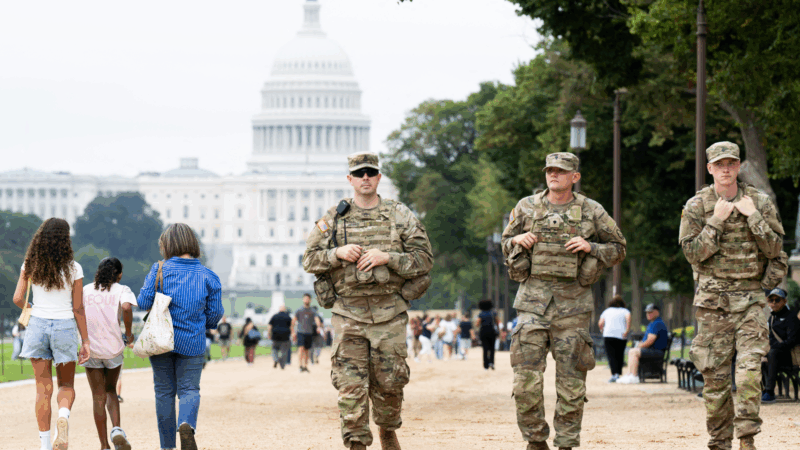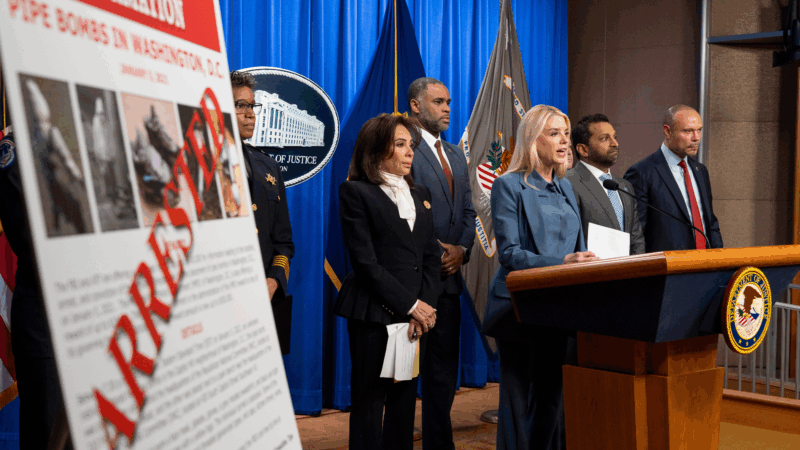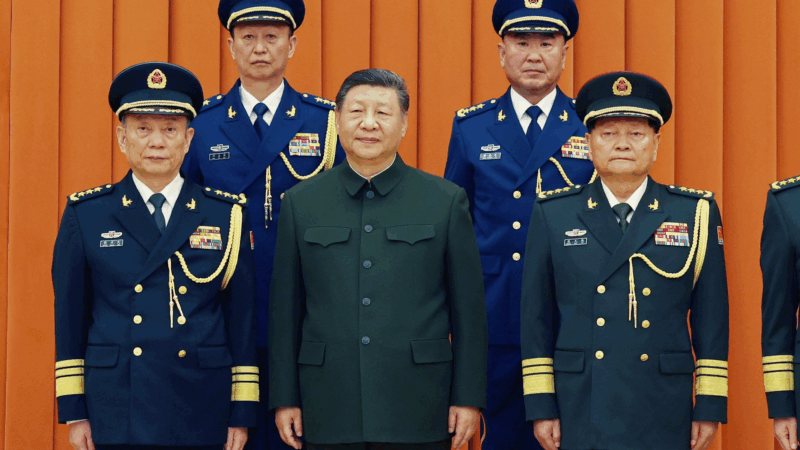The National Guard has been deployed to enforce the law before. What’s different now?
President Trump’s decision to assert federal control over Washington, D.C.’s police force and deploy National Guard troops to patrol the capital marked a stunning departure from governing norms, according to experts.
Since Trump’s order last week, hundreds of National Guard troops have set up on the streets of the nation’s capital and hundreds more are expected to arrive in the coming days.
The National Guard is a military branch distinct from others, in that its soldiers answer to state and federal governments, but the president has the power to activate a state’s National Guard without cooperation from the governor.
Since D.C. does not have statehood, its National Guard answers directly to the president.
National Guard troops are a familiar presence during times of crisis — they are often deployed to assist in catastrophic weather events, riots, and even were used during the fallout from the coronavirus pandemic.
During the 2020 racial justice protests following the murder of George Floyd, dozens of states called on their National Guards to assist local law enforcement, including in D.C., where at Trump’s orders, more than 5,000 troops patrolled the city to monitor the largely peaceful protests.

However, Trump’s decision to federalize them as a blanket response to crime in D.C. — which he has described repeatedly as out of control, despite the significant drop in the city’s crime rate — is a departure from the National Guard’s intended mission.
When has the National Guard been deployed before?
It is not uncommon for governors or the president to call on the National Guard in times of turmoil, but that was not always the case.
The nation’s founders were initially wary of military intervention in domestic matters.
“Their defining experience with domestic deployment of the military was the Boston Massacre and the quartering of troops in private homes,” said Joseph Nunn, an attorney at the Brennan Center’s Liberty and National Security Program who focuses on the U.S. military.
“The people who drafted the Constitution were extraordinarily suspicious of military power, so much so that there were vigorous debates at the Constitutional Convention about whether even to allow for the creation of a national standing army or whether the new country should instead rely exclusively on the state militias,” he said.
Ultimately, the Founding Fathers would determine that state militias should exist to be deployed in domestic matters only in cases of emergencies — the precedent for what would eventually become the National Guard.
Since then, from as far back as George Washington, presidents have called on state militaries to assist in federal matters. Washington himself led a contingent of the predecessors of the National Guard to suppress an uprising of Pennsylvanians against an excise tax on alcohol in the famous Whiskey Rebellion.
President Abraham Lincoln called on state militias at the outset of the Civil War to help in fighting Confederate turncoats to the South.
In more recent history, presidents have usually deferred to the wishes of governors in assessing whether a National Guard presence is necessary. But during the Civil Rights Movement, presidents on some occasions used their authority to supersede states’ rights to activate the National Guard.
That was the case in 1957 when President Dwight Eisenhower took control of the Arkansas National Guard to aid in the process of integrating public schools after Gov. Orval Faubus had ordered the Guard to block the famed Little Rock Nine from entering a school building.

In 1965, President Lyndon B. Johnson exercised his authority to take control of the National Guard in Alabama to have the troops protect civil rights advocates marching from Selma to the state’s capital, Montgomery.
For 60 years, that would be the last time a president went over a governor’s head to call on a state’s troops to deploy. In June of this year, Trump broke that longstanding tradition by federalizing thousands of California National Guard troops in Los Angeles in response to protests against immigration raids — a situation that happens “virtually never,” according to Nunn.
“To find a circumstance in which the federal government has deployed military personnel into a state to assist with civilian law enforcement over the objections of the state government for a purpose other than civil rights enforcement, you have to go back to 1894 and the Pullman strike,” Nunn said. “So what we saw in Los Angeles, in that sense, has no precedent in modern American history.”
Trump doubled down on his rejection of political norms again by activating the National Guard in D.C. — against the wishes of local leadership — to deal broadly with the issue of crime in the city.
“This idea that using the military for civilian law enforcement is a ‘break-glass-in-case-of-emergency’ kind of tool,” Nunn said.
“What we are seeing is intense challenges to that principle and the sort of normalization of military involvement in fundamentally routine law enforcement,” he added.
What makes Trump’s actions so different?
Experts say a major problem with calling on the National Guard in D.C. to address crime is that the military is not equipped to deal with law enforcement matters on a wide scale.
“Although they have the mission of domestic disturbances, they don’t get a lot of training in it, and they certainly don’t get the extensive training and the nuances that, for example, the police get,” said Mark Cancian, a retired Marine Corps colonel and a senior adviser with the Center for Strategic and International Studies.
The National Guard is meant to support police in enforcing the law, not enforcing it themselves, as outlined in the Posse Comitatus Act, which is meant to limit U.S. military interventions on American soil. As a result, they are often unarmed and do not themselves conduct arrests.
But an Army official told NPR earlier this week that troops in D.C. may soon begin carrying service weapons.
“That would make me extremely nervous,” Cancian said. “Because the police are trained at length about when they can use deadly force, and even then they get it wrong.”
That played out in graphic detail in Ohio in 1970.
That year, then-Gov. James Rhodes ordered members of the National Guard to respond to college demonstrators at Kent State University who were protesting against escalating U.S. involvement in Vietnam.
National Guardsmen would ultimately fire into a crowd of protesters, killing four students and wounding nine others.

There is also a fundamental difference in the way law enforcement are taught to perceive civilians versus what troops learn about the people on the other side, Cancian said.
“The military mindset is wrong,” he said. “The police look at the people in front of them as citizens who may be misbehaving, but they’re citizens. The military looks at people out there and sees threats that need to be neutralized, and that can lead to bad things.”
Cancian argues that the solution is an increase in local police presence rather than a standing order for the National Guard to patrol the nation’s capital.
Pipe bomb suspect told FBI he targeted U.S. political parties, memo says
The man accused of placing two pipe bombs in Washington on the eve of Jan. 6, 2021 told investigators someone needed to "speak up" for people who believed the 2020 election was stolen, prosecutors said Sunday.
Chinese military stages drills around Taiwan to warn ‘external forces’
The drills came after Beijing expressed anger at U.S. arms sales, and a statement by Japan's prime minister saying its military could get involved if China were to take action against Taiwan.
Trump and Netanyahu to meet in Florida at a crucial moment for the Gaza ceasefire
President Trump could use the face-to-face at his Mar-a-Lago estate to look for ways to speed up the peace process, as Israel's leader has been accused of not pushing his side to move fast enough.
‘Bomb cyclone’ forecasted to bring heavy snow, blizzard conditions and dangerous travel
A 'bomb cyclone' is intensifying severe winter weather for millions of people across the U.S. The system is expected to knock out power and disrupt holiday travel.
Russia sends 3 Iranian satellites into orbit, report says
The report said that a Russian rocket sent the satellites on Sunday from a launchpad in eastern Russia.
Viral global TikToks: A twist on soccer, Tanzania’s Charlie Chaplin, hope in Gaza
TikToks are everywhere (well, except countries like Australia and India, where they've been banned.) We talk to the creators of some of the year's most popular reels from the Global South.








